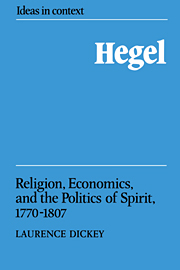Book contents
- Frontmatter
- Contents
- Preface
- Acknowledgments
- Introduction: Hegel in a Protestant cultural context
- Part I Hegel's Württemberg: “Civil Millenarianism” and the two faces of Protestant civil piety
- 1 The religious culture of Old-Württemberg: I. Christian eschatology and “down-to-earth” Pietism
- 2 The religious culture of Old-Württemberg: II. J. A. Bengel and the theology of the divine economy
- 3 The political culture of Old-Württemberg: The Alte Recht tradition
- Part II Württemberg's Hegel: Applied theology and social analysis
- Part III Toward the Phenomenology: Sittlichkeit becomes a problem in social and political theory
- Epilogue: Bildung and politics: The “first class,” Christian pride, and “absolute spirit”
- Abbreviations
- Notes
- Index
1 - The religious culture of Old-Württemberg: I. Christian eschatology and “down-to-earth” Pietism
Published online by Cambridge University Press: 11 January 2010
- Frontmatter
- Contents
- Preface
- Acknowledgments
- Introduction: Hegel in a Protestant cultural context
- Part I Hegel's Württemberg: “Civil Millenarianism” and the two faces of Protestant civil piety
- 1 The religious culture of Old-Württemberg: I. Christian eschatology and “down-to-earth” Pietism
- 2 The religious culture of Old-Württemberg: II. J. A. Bengel and the theology of the divine economy
- 3 The political culture of Old-Württemberg: The Alte Recht tradition
- Part II Württemberg's Hegel: Applied theology and social analysis
- Part III Toward the Phenomenology: Sittlichkeit becomes a problem in social and political theory
- Epilogue: Bildung and politics: The “first class,” Christian pride, and “absolute spirit”
- Abbreviations
- Notes
- Index
Summary
Only recently have scholars begun to recognize the value of Christian eschatological speculation as a resource for studying the intellectual history of early modern Europe. Indeed, it has become quite evident that very often the eschatological imagination figured prominently in debates over the purposes and directions of cultural life during this period of Western history. As E. von Dobschütz noted long ago, the key to exploitation of Christian eschatology as a source of historical evidence lies in envisaging it as a “living force” in the lives of past cultures. In that respect, the study of eschatology has important implications for how these cultures went about the task of what sociologists of religion today call the “social construction of reality.”
As we have noted, though, Christian eschatology has appeared in several different modes that differ markedly in terms of the urgency they assign to action relative to speculation about the Last Things. That is to say, differences in eschatology quite often arise out of a concern about the means rather than the end of eschatological fulfillment. To that end, scholars have distinguished, to name just a few sets of antitheses, thoroughgoing from futurist; inaugurated from consequent; realized from unrealized; revolutionary from evolutionary; existential from apocalyptic; and transmuted from sublimated eschatologies. More to the point of our purposes here, students of eschatology have learned to distinguish between “traditional–conservative,” “progressive evolutionary,” and “progressive revolutionary” eschatologies. Obviously, therefore, there are many ways of talking about eschatology; but the points to remember are that certain eschatological schemes are more action oriented than others and that the dynamics of certain historical situations are more appropriate for some eschatological modes than for others.
- Type
- Chapter
- Information
- HegelReligion, Economics, and the Politics of Spirit, 1770–1807, pp. 40 - 76Publisher: Cambridge University PressPrint publication year: 1987



